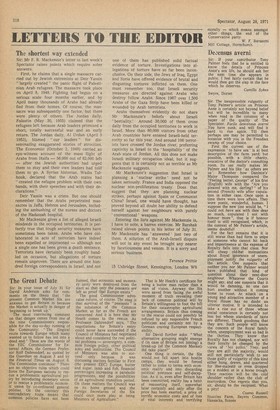The Great Debate
Sir: In your issue of July 31 Sir David Anderson asks for comments on the thesis that " the present Common Market Six are anxious to get Britain in because the Market is actually in danger of beginning to break up." The most convincing comment on that danger comes from one of the nine Commissioners responsible for the day-to-day running of the Community: "The illogical route towards Europe which many wanted us to follow has led into a dead end." These are the words of the EEC Commissioner for External Affairs, the German Professor Rolf Dahrendorf, as quoted by the Guardian on August 3 and by the Financial Times on August 6. The Commission continues! '' There are no objective rules which could force the European nations to rescue a problematic agricultural policy by introducing monetary union or to rescue a problematic economic union by co-ordinated general policies. On the contrary this contradictory route means that common policies have not been
formed, that economic and monetary unity were destroyed from the start so that only the peasants are left as proof that Europe exists."
The good Commissioner advocates reform, of course. The snag is that survival of the " peaSants ' is the substance of the Common Market as far as the French are concerned. And it is here that Mr Heath comes to the rescue. As Professor Dahrendorf says, "The negotiations for Britain's entry could never have succeeded if the Council of Ministers had negotiated about and considered the real political problems — sovereignty, a common foreign policy, other political aims and institutions. The Council of Ministers was able to succeed only because it was discussing matters familiar to First (the present EEC) Europe, butter and sugar, lamb and fish, financial percentages increasing in parabolic progressions, and the possibilities of an agricultural transition period. On these matters the Council was on its home ground and the Foreign Secretaries of the Six could once more play at being Ministers of Agriculture."
That is Mr Heath's certificate for being a butter man rather than a man of vision. Anyway the Six were saved from facing the awful moment of truth revealing their lack of common political will by Britain's willingness to foot the bill for their catastrophic agricultural arrangements. Britain thus coming to the rescue could not possibly be refused by any responsible French politician and certainly not by a German craving European respectability.
Sir David further asks: "What alternative grouping might emerge if (in case of Britain not joining) a break-up (of the Common Market) did take place?"
One thing is certain, the Six would not fall apart into hostile camps, they would be forced rather to come to terms with economic reality and into discarding political pretence and self-deception. As it is, even after Britain has been committed, reality has a habit of reasserting itself, somewhat later certainly and only after the price has been exerted, a price of terrific economic costs and of loss of vital interests and terrifying morally — which means amongst other things, the end of the Conservative party.
W. F. Barazetti Mill Cottage, Hornchurch.


































 Previous page
Previous page